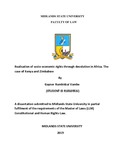Please use this identifier to cite or link to this item:
https://cris.library.msu.ac.zw//handle/11408/3926Full metadata record
| DC Field | Value | Language |
|---|---|---|
| dc.contributor.author | Vambe, Gaynor Rumbidzai | - |
| dc.date.accessioned | 2020-12-01T10:27:39Z | - |
| dc.date.available | 2020-12-01T10:27:39Z | - |
| dc.date.issued | 2019 | - |
| dc.identifier.uri | http://hdl.handle.net/11408/3926 | - |
| dc.description.abstract | The importance of devolution as a preferred system of governance in Africa cannot be further stressed. History shows a continent that has been marred by underdevelopment, socio-economic marginalisation and hence an unacceptable disregard of socio-economic rights. These challenges have been identified as some of the most stubborn shortcomings of a centralised government. As such this has been the unfortunate common experience of a centralised government that has been shared by Kenya and Zimbabwe. Both these jurisdictions have constitutionally entrenched the system of devolution. Kenya has established a thorough legislative and institutional framework for devolution. Zimbabwe on the other hand is still to operationalise the constitutional provisions on devolution. The Kenyan legal framework shows a strong commitment towards devolution as it manages to canvas through most of the essential matters on devolution such as detailing functions, powers and responsibilities of national government and subnational governments, as well as establish a framework for intergovernmental relations, amongst other matters. The Zimbabwean legal framework, consisting so much of the Constitution, establishes a few essential aspects of devolution such as the functions of provincial councils whilst the rest of the provisions on devolution are basically foundational and await operationalization through legislation. The system of devolution has been adopted with that hope that it can ‘cure’ the ills of centralisation and foster great socio-economic development in every region of these two jurisdictions since the subnational governments do have a developmental role to play. The Constitutions of Kenya and Zimbabwe both recognise socio-economic rights and are therefore obliged to see to their full realisation. Unfortunately, the challenges of centralisation mentioned above coupled with the shortage of resources, makes the realisation of socio-economic rights a real challenge. Fortunately, for the realisation of socio-economic rights, local governments can, if there is a successful implementation of devolution, contribute to the advancement of socio-economic rights. This research seeks to answer the crucial question; Can the current legal framework in these two jurisdictions advance the realisation of socio-economic rights? To do so it is crucial that gaps be identified and as such suggestions on recommendations be given based on international and regional legal framework and best practices. There is a need to design a legal framework that captures the fundamentals of devolution which makes it a good governance system so as to make progressive contributions to the realisation of socio-economic rights. The findings of this research show that there is real potential for the realisation of socio-economic rights through devolution. However, for this to happen it is important that the legal framework on devolution adhere to certain principles of devolution that enable efficient socio-economic development and public service delivery. These principles include public participation; accountability; local autonomy; and the principle of subsidiarity. Therefore, it is important that the legal framework on devolution put mechanisms in place to ensure that socio-economic rights can be realised through devolution. | en_US |
| dc.language.iso | en | en_US |
| dc.publisher | Midlands State University | en_US |
| dc.subject | socio-economic rights | en_US |
| dc.subject | devolution | en_US |
| dc.title | Realisation of socio-economic rights through devolution in Africa. The case of Kenya and Zimbabwe | en_US |
| dc.type | Thesis | en_US |
| item.languageiso639-1 | en | - |
| item.openairetype | Thesis | - |
| item.cerifentitytype | Publications | - |
| item.grantfulltext | open | - |
| item.openairecristype | http://purl.org/coar/resource_type/c_18cf | - |
| item.fulltext | With Fulltext | - |
| Appears in Collections: | Master of Laws: Constitutional and Human Rights Law | |
Files in This Item:
| File | Description | Size | Format | |
|---|---|---|---|---|
| Vambe Law dissertation final draft.pdf | Full Text | 1.13 MB | Adobe PDF |  View/Open |
Page view(s)
214
checked on Jan 11, 2026
Download(s)
294
checked on Jan 11, 2026
Google ScholarTM
Check
Items in MSUIR are protected by copyright, with all rights reserved, unless otherwise indicated.



